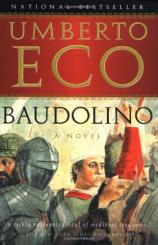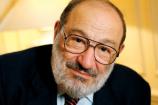Reading Group Guide
Discussion Questions
Baudolino

1. Who is narrating the first chapter of this novel? What scenes, characters, and events described here show up later in the narrative? Consider this passage, near the end of the chapter: "I said to him when you learn to read then you learn everything you didnt know before. But when you write you write only what you now allready so patientia Im better off not knowing how to write." How does this passage exemplify the novel's complex if not conflicted treatment of self-expression and communication (written, verbal, and so on)?
2. One of the few constants in this brisk, far-flung, and episodic adventure story is Baudolino's predilection to stretch the truth, rearrange the facts, fib, lie. What ironic points might Eco be making about the links between falsehood and history? Should all of history, in effect, be seen/read/understood as historical fiction? What are the "little truths" and "the greater truth" mentioned in Chapter 40?
3. Compare and contrast Baudolino's two "father figures." What sort of life does each man lead? How does each man die? What does each impart or pass onto Baudolino--physically, emotionally, and spiritually?
4. Discuss how, if at all, Baudolino the character both embodies transcends the many paradoxes at work in Baudolino the novel: sacred and profane experiences, high and low vocabularies, royal and common families, real and imagined miracles, etc.
5. Acknowledging this novel's many and various literary allusions, one reviewer described its protagonist as "a resourceful cross between Voltaire's Candide and Thomas Berger's Little Big Man." But what mythic traits, if any, did you identify in the character of Baudolino? How did he echo, for example, the Questing Hero? The Trickster Fool? Any others? Discuss.
6. What is the "green honey" that appears at several points in this novel? What does it do? Why is it so prized or disdained? And how does it relate to the novel's core struggle between illusion and reality?
7. "The limits of my language means the limits of my world," as the philosopher Ludwig Wittgenstein once remarked famously. Given Baudolino's almost super-human ability to learn any language, how would you label or define the limits of his world?
8. Who is Niketas? What dramatic and conceptual roles does he play in this novel? Explain how he influences and participates in the story Baudolino is telling--or doesn't he? How does the journey Niketas is making thematically relate to the journey Baudolino is describing? What is the "single thing" Niketas chooses to believe regarding Baudolino's tale? (see Chapter 26) And is this "single thing" is true or correct?
9. Discuss Baudolino as a mystery story. What, in your view, are its defining questions? Why is Baudolino forced to kill the Poet in Chapter 38--and why, a few pages later, does Kyot tell Baudolino (regarding the Grasal), "What counts is that nobody must find it"? And which of the key queries in Baudolino remain unsolved throughout?
10. Look again at the last two chapters of this novel. What happens to our hero in these final pages? How and why does Baudolino change at the end of the novel? How and why does he stay the same? Explore the question of whether Baudolino is ultimately a tragic or comic tale.
Baudolino
- Publication Date: October 6, 2003
- Paperback: 544 pages
- Publisher: Mariner Books
- ISBN-10: 0156029065
- ISBN-13: 9780156029063








